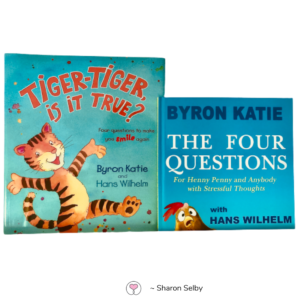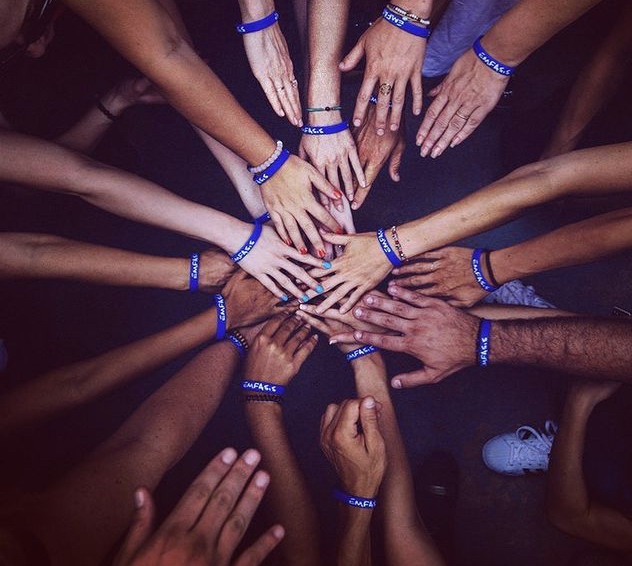 You may be familiar with author, and international speaker, Byron Katie. She has mastered how to turnaround anxiety. She is the founder of “The Work” which is a therapeutic process consisting of four essential questions and the “turnarounds”. Byron Katie has been interviewed by Oprah and TIME magazine described her as a Spiritual Innovator for the 21st Century.
You may be familiar with author, and international speaker, Byron Katie. She has mastered how to turnaround anxiety. She is the founder of “The Work” which is a therapeutic process consisting of four essential questions and the “turnarounds”. Byron Katie has been interviewed by Oprah and TIME magazine described her as a Spiritual Innovator for the 21st Century.
The Four Important Questions to Turnaround Anxiety
1. Is it true?
2. Is it absolutely true?
3. How do you react, what happens, when you believe that thought?
4. Who would you be without the thought?
Putting the four questions into practice…
I was recently delighted to discover that Byron Katie has written two children’s books that beautifully explain the power of our thoughts and the power of these four questions.
I’ve been teaching these four important questions, through her children’s books, Henny Penny and Tiger, Tiger Is It True?, in my children’s Brain Science groups. I’ve found these four questions and the turnarounds to be another valuable tool for ourselves and our children’s anxiety management “tool kit”.
When we go through the four questions, it’s very common for one to answer “YES” to the first question – Is it true? After all, this is their initial thought.
However, when we dig deeper and ask the second question, Is it absolutely true? then there’s usually some hesitancy….
I often hear something similar to: “Well I don’t know for sure that it’s true.”
This creates the opening.
We then ask them to think about how they feel when they have this thought? The answer is usually something similar to:
“Bad”, “Not good”, “Anxious”, “Worried”, “Scared”, “Nervous” etc.
We then ask how they would feel without this thought? Now they realize that they’d feel happier, calmer, more peaceful, and courageous without that first thought.
The Turnarounds
Lastly, we want them to think of approximately three “turnarounds” and some evidence to back up these “turnarounds”.
An Example of Using These Questions to Turnaround Anxiety
Before going through the four question process, I recommend reading one or both of Byron Katie’s books to your child so they understand the process. If you’re not able to access the books, then you can still explain the four question process ahead of time with an example from your own thoughts.
Once your child is ready to go through the process, it may sound similar to this:
Child: “Going to a new school is scary”
Parent: “Is that true?”
Child: “Yes”
Parent: “Is it absolutely true that going to a new school is scary?”
Child: “Well I don’t know for sure that it will be scary but I think it will be?”
Parent: “So you don’t know 100% for sure that it will be scary?”
Child: “Right”
Parent: “So let’s think about how you feel and act when you believe the thought that going to a new school is scary?”
Child: “I feel worried and bad and I just want to stay at home”
Parent: “I can imagine, so now let’s think how you feel and act when you don’t have that thought?”
Child: “I feel better and happier and I can enjoy my days”
Parent: “So which thought would you rather believe?”
Child: “The second one”
Parent: “Now let’s think of some turnarounds for the first thought”
Child: “A new school means new friends”
Parent: “Yes when you first started your last school, you made new friends”
Child: “If I feel “butterflies” in my stomach, I can think of them as excitement instead of worry”
Parent: “Yes, we all feel get the “butterflies” when we do something new and different and we can definitely think of them as excitement!”
Child: “Walking through a haunted house at Halloween is scary, not walking into a school full of kids and teachers!”
Parent: “That’s right, children and teachers aren’t scary! If that first thought comes back again over the next weeks, then go through these four questions and the turnarounds, and notice how much better you feel when you let go of that first thought!”
The Four Questions and Turnarounds for Adults
I highly recommend visiting Byron Katie’s website where she has video interviews of her leading adults with some very difficult circumstances through this powerful process. She’s also offering some live online workshops in the next coming weeks, for which you may wish to register.
I love teaching children and teens about the power of their thoughts. Our thoughts really do create our reality!
As Wayne Dyer said: “If you change the way you look at things, the things you look at change.”
If you would like help teaching this tool to your children, as well as many other anxiety management tools, there’s still some spaces left in my August Brain Science groups, starting August 11th, 2020. These groups are for children ages 7-9 years and 10-12 years to learn about anxiety and how to manage it. You can choose to have your child participate online through Zoom (particularly useful if you don’t live nearby or you’re away) or your child can attend in-person, or a combination of both if you’re away for some of the sessions. To find out more information to help turnaround anxiety for your child and to register, please click here.
Wishing you a joyful and safe summer,
Warmly,

PS. For other articles on changing negative thoughts you may wish to read:
Negative Emotions and The Importance of Handling Them Well
How to Change Our Children’s Negative Thoughts
Want to Connect?
Subscribe now to receive free weekly parenting tips and inspiration.






